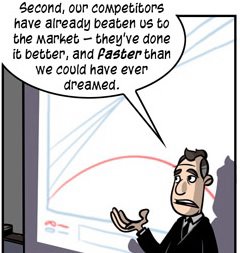 Life is just, you know, rough.
Life is just, you know, rough.Just when you're thinking to yourself that your idea's a go, someone's already beaten you to the market, with implementation and a large social network, and have done it better than you though you could.
I had this idea to build a social network of wifi owners that shares their internet access as a wide area grid. Sort of a web2.0 way of network access. For anyone who's willing to share their internet connection, we mark their location in a Google Map application, and provide him with a hacked Linksys wireless router with custom firmware, and perhaps an anthena, as well as free access to the whole grid / service. What the firmware does is to mash all the sharepoints together to form a huge Local Area Network to enable some fun features that we can play with (more on that later). It would be easy to cover major areas of the city with wifi access, given the insane density of population.
Some of the fun application I can think of on top of my head are things such as location based communication, grid-based file sharing and perhaps even geocaching done in wifi hotspot style. Why? because this allows anyone with a laptop / palmtop / PSP with wireless capacity to know their rough location without any GPS equipment, and we all know how well GPS works in a dense city filled with high-raised buildings.
 And then I heard about FON, and investment by Google and Skype.
And then I heard about FON, and investment by Google and Skype.Essentially FON is doing Globally what I was talking about locally. They take a slightly different path of just offering the software (the afore-mentioned firmware) free instead of the hacked router. It makes sense given the cost implication of giving anyone in the globe interested a $50 product for free. If your customers / participants are willing to go through the trouble of installing the firmware to their Linksys router, it'll achieve the same effect as giving them the hacked router.
So from what I've learnt from FON's business model, here's a list of some problems with this so very rough idea:
- Cost: To provide incentive, we're essentially giving out, or at least subsidising wireless routers. Each of these babies cost around $50USD, which isn't bad on it's own because they're great routers. But things get real expensive real fast when you're trying to have a bunch of them cover a city area. As mentioned above, FON was using the software approach to eliminate this cost. It's fine with technology-awared crowd, but impossible for anyone who knows just enough to plug wires into a box. Also, it's just impossible for those who have anything other than Linksys (because of hackability, if there's such a word). You're going to confuse the heck out of a lot of people if you just tell them to go install this firmware, especially here, not a lot of people are tech-savy enough to know better.
- Business Model: Of course we're eventually looking to charge for this service, either to the customers or advertisers willing to put the network to the test. Because of the social effect, it's not hard to have major parts of the city covered. FON is doing something interesting though: they are shooting to partner with 2nd or 3rd in line ISPs to provide them with a competitive advantage. Say for example they partnered with Earthlink. Earthlink can say to their customers: You subscribe to our service, and not only do you have broadband at home, you'll have access to our FON network of wifi hotspots as well, and that is global. Now this, I have to give it to them, is just a creative idea. This is definitely not the model for us, at least not when we're only overing a city's worth of area. It's too small an area for any ISP to build their own and effectively elimate us with their marketing budgets
- Which brings me to my third point: Competition. In order to do something local ISP can't duplicate, the idea of web2.0 wifi hotspot sharing must extend beyond local cities. This is our competitive advantage against giant ISPs such as Netvigator: It cost them a lot more to set things up in China than it does for us. From the travel pattern of this city, China (or at least southern China) is our best and most logical extension.
- Legality: What we're sharing out is essentially bandwidth of major ISPs, whichever volunteers choose to use. Bandwidth is expensive, and I'm sure the big boys aren't going to be happy when a couple of neighbours can easily share what is basically one account. Not that they can't right now, but we'll be out there, an easy target for a law suite, to make an example out of us. I can't think of any solution, but what the hell, we'll figure it out when the time comes. This area of legal issue is certainly worth looking into though.
- Profit sharing: What strikes me as another genius of FON is that they're saying they want to share some of the profits with volunteers. Potentially, if you're using Mr. Smith's FON access point, you're paying a certain rate for the service when you're on, and Mr. Smith will get a part of that money. This is real good incentive. We may have to use this tactic to persuade some of the sharers in popular area like malls.
P.S. recent posts has been rather unstructured, soft of type-as-words-come-into-my-mind thing. My apologies, but I'm trying this way of blogging will improve my though process and allow me to brainstorm a little better.
No comments:
Post a Comment